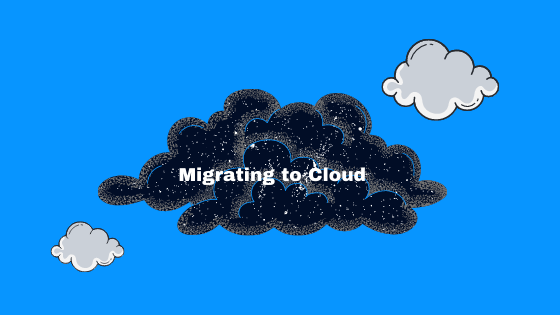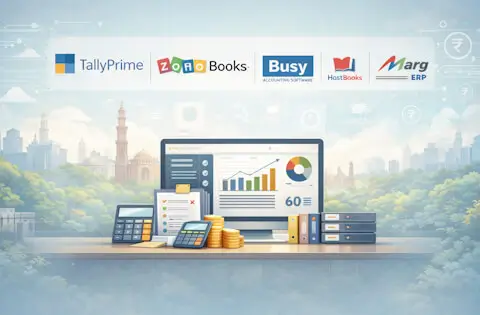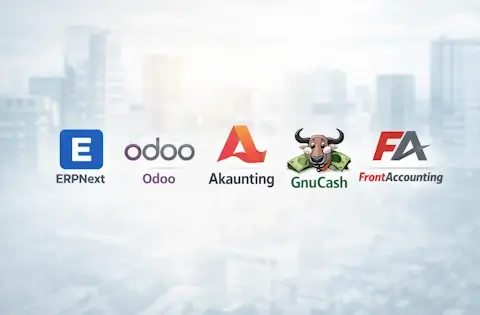7 Ground Challenges of Adopting & Migrating to Cloud Accounting

Migrating to the cloud is not at all optional, but it is mandatory for businesses today that can potentially grow any business.
And let us not manipulate the rise of cloud accounting migrations with COVID-19 scenarios.
Most people think because of COVID-19 a large number of businesses have migrated their accounting systems to the cloud.
COVID will come and it will go.
But the cloud technology will flourish over time and it will stay forever to help uplift business and technology.
We are living in the 21st century where mobile and mobility have become the need of the hour.
And from invoicing to accounting most software vendors have already acquired the secure cloud infrastructure to provide software services to their customers.
However, most businesses are afraid of the word online when it comes to financing and accounting.
Because online is often looked down on as a non-trusted platform for keeping business and financial data on the cloud.
So here are some of my personal opinions based on my experience working at the ground level and interacting with a lot of people and businesses.
7 Ground Challenges of Adopting & Migrating to Cloud Accounting Software
The challenges that most concerns foresee while making the decision to implement cloud accounting software are manifold.
But one question that I often get from most people is “What if my Data is Lost”.
And there are many other similar questions that may vary from one person to another or business to business.
However, these concerns are baseless for cloud technology companies because they know well what they are doing.
But for end-users, it’s all about their business and the safety of their data and information.
So what I understood about consulting with smaller enterprises about migrating to cloud accounting is described here.
1. Internet Connectivity
With cloud-based accounting software, you constantly require an internet connection.
So this is the first objection that comes from people.
Because if there is no internet, activities such as billing and accounting may collapse and come to a halt and that is where they think it can directly impact a business.
So businesses has the fear of using the financial application on the cloud.
And they feel that the internet is a non-reliable source to power their accounting platform.
But I feel businesses should not worry about internet connection, because the internet revolution has surpassed human expectations in recent years with the launch of the 5G and Fiber Network.
5G may get banned if it interferes with health issues in the future.
But even a 4G speed is enough for small enterprises to run an accounting system on the cloud.
And in a place like India, the cost of the Internet is very cheap compared to other countries.
Also, companies like SpaceX are heavily investing in the satellite internet connection which is also expected to be launched soon in India.
So broadband and internet connection shall be available at low latency rates to meet the needs of internet consumers.
Thus the internet and the cloud revolution will go hand in hand to support each other needs.
2. Security Issue
Cloud accounting software is recognized as a new line of technology solutions for businesses that can potentially transform smaller enterprises.
But it depends on how the smaller enterprises use the cloud to conduct their operations.
Because there is a considerable disconnection between enthusiasm and action taken by this industrial sector.
Small and micro-enterprises do not perceive cloud accounting systems to be stable and mature enough for adoption.
As doubts still exist among businesses and people if migrating to the cloud would be safe or unfair.
So security is one aspect in which I feel smaller enterprises are often most misguided.
They feel that by moving to the cloud their data will be at risk.
And their financial data may be hacked or attacked by some virus or destroyed.
But nothing can be further from the truth.
If that were true, net banking wouldn’t have existed and it would have failed for this reason alone.
GST and Income Tax filing would have been prone to hacking
And most importantly communicating via email would have not existed and stock markets would have closed.
We understand security is a major concern, but at the same time, there are precautions and top measures that play a major role in keeping it safe.
Big companies have already using it for a long time and smaller enterprises can learn and understand from big companies how they operate on the cloud.
So anyone can willingly decide for migrating to the cloud.
3. Lack of Awareness
Awareness is necessary for those people who are far away from the truth.
The truth is most small and micro-enterprises are not aware of using the true power of the Internet in business.
There are millions of traders in India who still use pen and paper to do billing.
So what to talk about when using cloud accounting systems?
Therefore it is not easy to convince them or move them directly to an online accounting system.
Some don’t even have computers and they don’t know how to operate a computer.
On the other hand, today we have accounting apps that come for devices such as iOS and Android.
So I feel the micro-enterprises should learn to use the internet not just for email.
But use the internet to automate their business as well where online accounting software can solve most of their business challenges.
Blockchain is another new technology that is evolving at this time to make online transactions highly secure.
So I feel smaller enterprises should look forward to implementing new technology in business to grow better.
Compromising your business using outdated technology is like compromising your health for medicine.
If you don’t take medicine you won’t get well.
Similarly, if you don’t upgrade your business using the latest technologies your business may collapse over time.
There are many loopholes in business and implementing a cloud system can be a good solution to this problem.
4. Owner Versus Accounts People Decision
With the rise of automation, AI, and online accounting software, most accountants or in-house CAs interpret that their jobs will be in danger.
So there is chaos between accountants and the owner of the firm related to which accounting software they should use.
Accountants think if businesses and industries go for automated and online accounting systems what is their purpose in the industry?
So a majority of accounts people aren’t ready to accept the change.
Mostly in smaller enterprises, the decision-maker is an accountant or a CA of the firm rather than the owner of the firm when it comes to choosing accounting software.
Business owners give full authority and power to accountants so most decisions about accounting software are taken care of by accountants and CA.
Business owners are busy operating their manufacturing plants and workshops so they have no idea about using accounting software.
So whenever a cloud accounting vendor tries to convey a suitable accounting system to a business owner.
Business owners mostly have no idea about what to choose and instead rely on accountants to choose what they want.
This is the reason why most business owners could not adopt cloud accounting systems.
And they are bound to use the outdated accounting software installed on-premises.
But what business owners need to understand is that time has changed, and we all need an upgrade.
And accounts people need to understand that automation will help them tremendously at work and this won’t replace humans.
5. Locking of Systems by Vendors
Usually, this is not a ground challenge but users who have experienced online accounting systems for a while understand well what is meant by locking of systems.
Usually, a subscription-based software model is a software-as-a-service model.
Therefore you don’t own the software, the vendor owns the software, but what you own is the services as you pay a vendor a monthly or a yearly charge.
So some customers look at it as a challenge, because they think if they fail to pay on time the system will get locked automatically whenever the subscription period gets over.
But there is nothing to worry about if you feel you are capable of meeting the subscription charges every year.
Because the amount of subscription is little or nominal.
Most vendors even offer a fair discount if you pay yearly charges at one go rather than paying monthly.
However, there are online accounting systems present within a limited number of vendors that do not have a lock system.
And one such vendor is RealBooks as of now but over time the company’s policy may change at any time.
But you are free to explore the system.
6. Pay Per User/ Per Year
This is another challenge for small enterprises that have already experienced paying for additional users.
Although some accounting vendors do provide multi-users at the time of purchasing a subscription.
Most do not because most businesses need a single user as solo entrepreneurs.
So cloud accounting vendors have options to add as many users over time starting from 1 User to N Users.
But the cost may be calculated as N Users by Amount of Charges for a Single User.
So this drills down to a large amount that you should be paying every year as a subscription charge.
Now in connection to the locking system discussed above, this is evident from the fact that if you can’t pay off the subscription on time.
Then even though you have N number of subscriptions for N number of users you can’t use the system.
Because it will lock down the entire system.
And this could be a big challenge for firms that have a large number of concurrent users.
But not so complicated for firms that use a single user or two users.
And if you compare this scenario with an offline accounting system this is like different two sides of the same coin.
Because most offline systems don’t necessarily have a pay-per-user per-year costing model.
7. Personal Choice
Neither the world can do anything nor we can do anything when there is a matter of individual choice of a business owner or an accountant.
If someone is not interested or too fearful we can’t force anyone. So this is what I call personal choice.
Back in 2017, when India launched the GST taxation system in India.
I was directly trying to sell to business owners my first copy of an online accounting software subscription by visiting small vendors door to door.
And there I came across people who turned me down saying “No business would ever keep their financial data on the cloud”
In a developing country like India tax evasion is a big problem and it is already there for a long long time.
So as a measure to protect the real data and identity, most people fear migrating to cloud accounting.
But I don’t have any personal guided opinion against what people think.
Because it’s the sole responsibility of business owners to understand what works for them and what doesn’t.
But today we can find millions of businesses across the world that are using the cloud platform to manage their businesses and groups of enterprises.
And thousands of IT companies are investing in the development of cloud and financial apps.
Also in another year or two Blockchain and AI will dominate accounting and financial applications on the cloud.
So business needs to change and business owners need to rethink using advanced technology in operating books of accounts.
However, if you are already motivated and are looking for a change, migrating to the cloud is a simple process.
Migrating to the Cloud from an On-Premises Accounting System
Migrating to cloud accounting software can be difficult yet very simple and of course easy.
So there is nothing to worry about.
However, with a few online accounting applications, businesses may struggle to migrate to cloud accounting if there are no available features for a seamless migration.
Cloud migration is often seen increasing with firms that are either expanding their locations or adding more manpower into business.
Today cloud accounting doesn’t only mean invoicing, billing, or accounting, but it is more than what you could do.
Most cloud accounting software is a combination of accounting, inventory, and payroll systems that are tightly integrated into the system
Some even offer advanced inventory management and manufacturing modules.
With the growing need and complexity, almost all business accounting systems today need an upgrade.
Therefore location-based businesses should seamlessly migrate to cloud accounting as immediately as possible.
Even a single location-based business could migrate to cloud accounting with many added advantages for sure.
Because you run your business efficiently on the go anytime and anywhere as there is no software installed on your premises.
Instead, you access your business data via apps on mobile devices.
Cloud Migrations & Backups: What most businesses are not aware of?
One of the most asked questions that I often receive from customers is “I Need Backup”.
Most business owners are worried about backup and they want to take a backup from a cloud accounting system.
And when I say you don’t need to take backup, this makes them worried “What if my Data is Lost”
How can we recover the data in case of any discrepancy?
But this is not applicable when we talk of cloud accounting, therefore simply some people don’t prefer the cloud platform.
Unlike traditional accounting software, cloud accounting software does not allow you to take backup.
However, most online accounting software does provide the option to take backup, and ZohoBooks and RealBooks are great examples.
But data is useless without apps as backups are available either in an Excel or a PDF file.
The value of data comes along with subscription software so when only you have an active subscription you can analyze everything.
So, one important question is.
Are backups important, if you migrate to cloud accounting software?
The answer is an absolute No.
You aren’t require taking any backups after you migrate to the cloud.
Cloud accounting as the name implies is the application of business accounting software accessible via the cloud.
So what is important to note here is you are free from taking backups of your accounting data.
Because you hold a subscription and not the software.
Therefore neither you need to worry about backup nor do you need to worry about any hacking or loss of any kind of data.
These things are taken care of by cloud vendors 24X7 so that you can focus only on your business.
Reasons Most Businesses Aren’t Willing to Migrating to the Cloud
Here awareness is the key.
Most micro, small, and medium enterprises think that by migrating their financial data to the cloud they are at risk.
This is the reason why most businesses are not willing to migrate their business and accounting software to the cloud.
Because they feel that the cloud is a non-reliable source for business and there is a lack of privacy or loss of data.
However, this is not true.
Today we can find millions of businesses across the world that are using the cloud platform to operate their businesses and finances.
And in a year or two blockchain and AI will dominate accounting and financial applications on the cloud.
Moreover, bank transactions occur on the cloud, emails are done via the cloud, and stock market transactions operate on the cloud.
So there are many other live examples of how cloud platforms have been performing.
If the cloud were insecure these platforms wouldn’t have existed for years.
Who is Adopting the Cloud Systems and migrating to the Cloud?
Smart businesses have already adopted the cloud and it is increasing day by day.
Most business has a neat and clear business transaction and they have no obligation against the cloud.
So cloud accounting vendors are the first ones to invest heavily in cloud technology and constantly accept the challenges.
We all know that the cloud is the future and the future is in the cloud.
Today everything is happening on the cloud, from income tax filing to GST filing including online bank receipts and payment.
Migrating your business online is a very easy process.
The only thing that you need depends on your acceptance and your approval and an online accounting subscription.
Moving to the cloud means you are directly impacting your businesses every single day because you have access to your business in real-time.
And this is simply rewarding because you can make decisions at the right time.
How Easy is the Migration Process of Standalone Systems to Cloud?
If your business has been running on a DOS-based system or a Windows-based System.
It’s time to upgrade accounting systems that do not provide you any access to your business in real time.
To overcome this you could seamlessly migrate your old existing system to the cloud.
However, not all cloud accounting systems are the same.
Because cloud systems should support a seamless migration of your existing data.
Some accounting subscriptions may not have the option of importing your data for a bulk upload.
This is because online accounting software is a new area where cloud vendors need to improve their systems.
So if the cloud accounting software has reliable features that can import your existing data.
You can easily migrate your existing accounting system to the cloud accounting system.
The basic migration takes place by importing your master data opening balances.
Whereas some accounting apps may provide import of transactional data as well such as Sales and Purchases.
So if you are aware of online accounting systems that do support the migration process easily.
You should adopt a system that provides you the flexibility to migrate your data with ease.
What is the Process of Migrating to Cloud Accounting?
When you go for a cloud accounting subscription make sure there are available options to import your masters and transaction data via Excel or any other medium.
This will surely help you to make a seamless transfer of your existing data to the cloud.
And in most cases, cloud accounting vendors may help you to migrate your data.
But how about if you could do it yourself?
Export your master data in Excel from the existing software first and then you can easily import all your masters using the Excel template.
But where do you get the Excel template?
These are features that a few online accounting vendors may provide.
So if the feature does exist in an online accounting subscription you can easily do the work by yourself.
Either it is about importing master data such as customers or vendors or it is about importing inventory such as items and item groups.
You need an easy-to-use user interface UI that allows you to easily import all your data.
Also, migrate the opening balances for ledgers as well as inventory and start using the system anytime during the year.
So make sure you choose the right cloud accounting software that is scalable and robust for all your business needs.
What is Great or Good about Migrating to Cloud Accounting Systems?
The answer is simple.
Regardless of your physical presence on-site cloud accounting software makes your business available 24/7.
So it saves a lot of time and money and you can instantly access anything you want whenever and wherever you want.
And you can seamlessly access your income, assets, and liabilities via mobile apps. which are the pillars of all businesses either small or large.
Today each and every piece of information is available online.
And whether it is about returns filing or income tax filing every task is being done online.
So when government data are all online why can’t we think about moving our financial data to the cloud?
Organizations such as Amazon, Microsoft, and Google play a major role in securing cloud infrastructure and data services.
Solutions providers are using their services to provide a scalable accounting system today for small to large businesses.
Therefore moving to the cloud is easy and safe.
I look at it as an added advantage for small and micro-enterprises.
But, your positive opinion is more important.
Contact me for any free support if you would like to migrate your existing accounting system online.
I can help you to do the same and ensure that you enjoy moving your business systems to the cloud.
Conclusion:
Time changes, technology changes so is the need for an upgrade within enterprises.
Managing finance and accounting is an integral part of any business.
Therefore accounting should be handy at all times as it is one of the vital components of a business.
I think a lot of organizations are adopting the work-from-home or remote-location work policy today due to the pandemic.
Therefore the adoption of online accounting software started booming among entrepreneurs and small enterprises.
It is also expected to rise at a bottleneck speed by 2025.
Small businesses and enterprises are trying to understand today how accounting software can be beneficial for them if they move to the cloud.
Investing in cloud-based accounting software can bring in a high level of efficiency, flexibility, and good collaboration between employees and employers.
Therefore today is the perfect time to experience the best of cloud technology for all businesses.
And migrating to the cloud seamlessly will ensure proper reporting.
Related Resources:
What is an Accounting System? Accounting Components, Types and Examples
8 Best Cloud-Based Accounting Packages for Indian SMEs (2026)
What is Accounting: Meaning, Types & Why It Matters
Best Accounting Software in India 2026: Features, Pricing & GST Compliance
5 Best Open Source Accounting Software for Small Business 2026
The 5 Best AI Accounting Software for Small Business
Best Accounting Apps Online To Improves Cashflow and Profitability
Top Free Accounting Software Options for India GST
The CAs Tech Stack: 5 Best Accounting Software for CA Firms in India 2026



